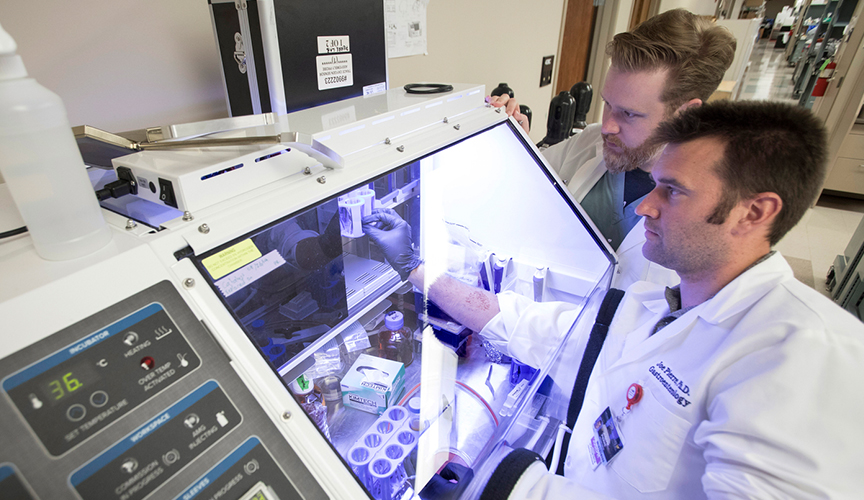Metabolism and Gut Mycobiome
Gut fungi may contribute to important aspects of health, such as metabolism and accumulation of body fat, says new research from investigators at UTHSC and Le Bonheur. In the study published in Communications Biology, Joseph Pierre, PhD, and colleagues explored potential links between the gut mycobiome (the fungal community of the microbiome), the environment and metabolism in mice exposed to a standardized or processed diet for eight weeks. Results showed that changes in the mycobiome could potentially contribute to increased fat mass and insulin resistance, which are hallmarks of obesity. These findings could have important implications for conditions such as obesity and diabetes.

Joseph Pierre, PhD (far right)
The standardized diet had a normal balance of carbohydrates, fat, fiber and protein. To mimic an unhealthy western diet, the processed diet was high in carbohydrates and fat, contained normal levels of protein and lacked fiber.
On the standardized diet, gut fungal communities showed decreased diversity over time and became more homogenous. However, these fungal communities remained distinct from one another. On the processed diet, gut fungal communities also showed decreased diversity over time but converged and were no longer distinct. The composition of fungal communities was also markedly different between mice on the processed diet and mice on the standardized diet.
These changes in gut fungal community composition in response to the processed diet were linked to changes in body composition and metabolism. Most mice gained fat mass on the processed diet. This increased fat mass was associated with increased fasting leptin and ghrelin in addition to decreased resistin; leptin, ghrelin and resistin are hormones associated with hunger suppression, hunger stimulation and insulin resistance, respectively. Changes in the abundance of two types of fungi, Thermomyces and Saccharomyces, were associated with increased triglyceride concentrations in the blood and fat deposits in the liver.
This study shows that the makeup of the mycobiome is dynamic and responds to environmental and dietary changes. These findings could have important long-term implications for conditions such as obesity and diabetes.
Mims TS, Abdallah QA, Stewart JD, Watts SP, White CT, Rousselle TV, Gosain A, Bajwa A, Han JC, Willis KA, Pierre JF. The gut mycobiome of healthy mice is shaped by the environment and correlates with metabolic outcomes in response to diet. Commun Biol. 2021 Mar 5;4(1):281. doi: 10.1038/s42003-021-01820-z. PMID: 33674757; PMCID: PMC7935979
Help us provide the best care for kids.
Le Bonheur Children's Hospital depends on the generosity of friends like you to help us serve 250,000 children each year, regardless of their family’s ability to pay. Every gift helps us improve the lives of children.
Donate Now










